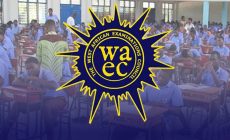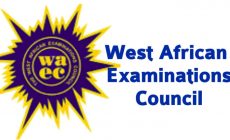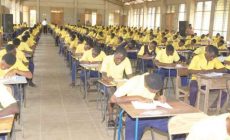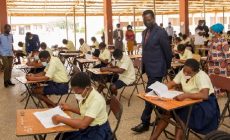“The investigations will continue and persons found culpable will be sanctioned as appropriate,” a statement signed by the council’s Deputy Director of Public Affairs, Mrs Agnes Teye-Cudjoe, said.
The Daily Graphic of yesterday reported the widespread leak of three papers — Oral English, Social Studies and Integrated Science — through social media, particularly Whatsapp.
A Whatsapp group chat with one Neezy Ranking, the administrator and alleged student of a first-class senior high school (SHS) in the Eastern Region, was one of the sources of the leaked papers.
Some students had access to the leaked papers between 12 midnight and 4 a.m. on the day the papers were written.
In the case of the Oral English, the questions were answered and the answers widely circulated.
In the midst of the confusion that the latest leakage has created, the statement issued by the council urged all the candidates to remain calm and focused.
It reminded them that they could pass their examination without cheating.
WAEC explains
Giving a background to the current episode, the statement said before the papers were issued from the depots, the council had detected a number of different versions of the questions in circulation but found them to be fake.
“It was, however, detected that some authentic questions went into circulation after the papers were released to the examination centres.
“The council suspects that this foreknowledge was perpetrated through the connivance of some persons engaged for the conduct of the examination and their agents,” it said.
While pledging to clean the system, WAEC also cautioned candidates to stay away from such materials because the council had the mechanism to detect those who benefitted from the malpractice and would not hesitate to apply sanctions.
It also appealed to the public to offer information that could help it prevent the malpractice on telephone number 0208179309.
It further urged the media to be circumspect in their reportage on the ongoing examination in order not to create unnecessary anxiety among candidates.
No prosecutions
Without giving further details, the council said it was collaborating with the security agencies to track down those involved for prosecution.
Ironically, WAEC last year expressed disappointment in the Ghana Police Service for its failure to prosecute a policeman and two others who were caught for their alleged involvement in the leak of Basic Education Certificate Examination (BECE) papers at Asiwa in the Ashanti Region.
Lance Corporal Prince Opoku, who was to escort the BECE materials from the Konongo depot to examination centres at Asiwa on June 16, 2014, conspired with Kingsley Isaac Aidoo, a supervisor, and Obed Opoku, a driver, to break the seal and leak the examination papers.
The Very Rev. Dr Samuel Nii Nmai Ollennu, the Head of the Ghana National Office of WAEC, said the non-prosecution of the policeman was frustrating, as it did not serve as a deterrent to others.
GNAT reacts
The General Secretary of the Ghana National Association of Teachers (GNAT), Mr David Acheampong, agreed with the view expressed by the Very Rev. Dr Ollennu and said the failure to punish people in the past was partly responsible for the leak of examination papers.
“We don’t need to shout over this if we are not dealing with the culprits who flout the regulations and bring the entire country shame,” he said.
While WAEC and teachers are engaged in a blame game over who should be held responsible for the recurrent situation, Mr Acheampong said WAEC was to be blamed.
“It should be blamed. It has its own security press where all the papers are printed, packed and, with police escort, sent to its depots under the supervision of its staff.
“Teachers have access to the papers only 30 minutes before the start of the exam, but where questions leak two days ahead of the exam, then no one but WAEC should bear the blame,” he added.
A worthless certificate abroad?
The effects of a compromised WAEC examination are far-reaching, as in the United States and some countries in Europe, particularly the United Kingdom, the WASSCE is viewed with suspicion and deemed not sufficient for admissions.
The Oxford University, for instance, has stated on its website that students from Ghana, Nigeria and other countries in the developing world would have to take other examinations to qualify for admission to that university.
“If your qualification is listed as being insufficient to make a competitive application to Oxford, then you will need to undertake further study if you wish to apply.
“You could take British A-levels (the British Council may know where you can take A-levels in your country), the International Baccalaureate (IB), or any other qualifications listed as acceptable on this page. The first year of a bachelor’s degree from another university could also be an acceptable alternative,” it said.
Leaks in recent past
While WAEC maintains that there was no leak but foreknowledge of the question papers, there is growing public anger over the incident.
The council has, for some time now, been struggling to stop the leak of its examination papers which candidates must pass to qualify for admission to tertiary institutions.
September 2009
There was a reported cancellation of the English Language One and the Mathematics papers in the November/December 2009 WASSCE.
April 2013
WAEC commenced investigations into circumstances that led to the leak of some papers in the WASSCE. It launched a nationwide inquiry while making preparations for students to re-write the leaked papers.
April 2015
WAEC denied the leak of its Core Mathematics paper in the 2015 WASSCE. According to the council, since it had not received any report from its officials at the various centres, no investigation could be carried out into the said allegation.











 (Selorm) |
(Selorm) |  (Nana Kwesi)
(Nana Kwesi)